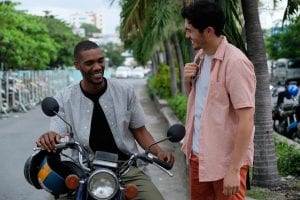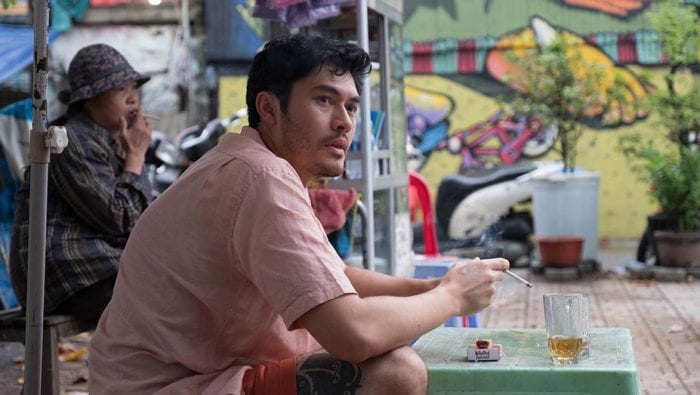Reviewed by Jeffrey Sanzel
Writer-director Hong Khaou made his feature film debut with the critically acclaimed drama Lilting. It is the story of a mother’s grief after her son’s untimely passing, along with her attempts to communicate with her son’s lover, even though they don’t speak the same language. His beautiful sophomore outing, Monsoon, focuses on a different kind of loss and addresses the barrier not just of language but also of culture.
The film opens with a bird’s eye view of traffic, with cars and motorbikes flowing in and around each other, paying no heed to lights or lines. This world is a strangely organized chaos into which Kit (Crazy Rich Asian’s Henry Golding) steps.

Kit has traveled to Vietnam, having left at the age of six. His family had escaped and sought refuge in England after the Vietnam War, and now he has returned to scatter his parents’ ashes. The plot is simple, but his burden runs deep: Thirty years later, he realizes that he no longer feels a part of his home country. He is incapable of speaking his native language and does not recognize so much of the changing landscape.
Along the way, he reconnects with a childhood friend, Lee (David Tran), whose happiness to see him is muted by wariness. Lee reveals that Kit’s mother had lent Lee’s family money to set up a small business. Lee is afraid that Kit will ask for a repayment of what Lee perceived as a loan. While trying to find his bearings, Kit’s one-night internet hookup with an American entrepreneur, Lewis (Parker Sawyers), turns into a romance.
Kit decides that he doesn’t want to bury his parents’ ashes in the Saigon family home because it seems on the verge of being torn down. So, he ventures to Hanoi, his parents’ birthplace. He takes the thirty-eight-hour train trip to see if it would be a more appropriate resting place. On the train, he briefly encounters a traveling Frenchman, Stephane (Edouard Leo), who mistakes him for a native. Once again, Kit feels that he is a man out-of-place. (Whether or not they hook up is left open-ended.)
The film consistently shows and does not tell with moments of tempered joy. Lee brings Kit to the location of the pond where they used to play. Long gone, now it is the site of a half-finished building, with stacks of bricks and scaffolding. And yet, there is a faint glint of happiness in Kit’s eyes as he remembers the bridge that spanned the pond. It is a small moment and shows a modicum of hope.

He strikes up a friendship with Linh (Molly Harris), a curator/guide who gives Hanoi’s art tours. She brings him to her family home, where he partakes in the scenting of lotus tea, her family’s business for generations. It is a scene of great charm and simplicity and one that gives Kit another opportunity of belonging.
Monsoon is an intimate movie. It is about inward reflection and searches for identity. Much of the film watches Kit try to take in the new Vietnam to understand his roots. Across from his upscale hotel are barely livable shacks. Great wealth lives side-by-side with crushing poverty. Kit stands in the center of this whirling metropolis — in the eye of the storm. He feels the pulsing of the city in all its relentless intensity. The story is more episodic than linear, a series of experiences where Kit tries to bring past and present together.
For much of the film, the dialogue is minimal; the narrative relies upon Kit’s reactions. It is a quiet film but not told in silence. There is the constant cityscape of noise and traffic that underscores almost every moment.
Monsoon only touches on the Vietnam War, but it is always looming. Lee speaks of it and its devastating aftermath but does so in hushed and tacit tones. Lewis shares his father’s eighteen months in the War and twenty confirmed kills. Years later, he committed suicide. Whether these two things are related is never made clear.
Sawyers makes Lewis likable and slightly enigmatic. His ability to convey his understanding of Kit enriches their relationship. Tran is a bit stiff as Lee, but this could be intentional; he never seems at ease, making his interactions with Kit appropriately uncomfortable. Harris is delightfully outgoing, and her engaging brightness gives energy to her brief scenes.
But the film is entirely Kit’s, and Golding is remarkable. He looks; he walks; he touches; he stops; he explores. Golding makes each moment count. His Kit is complicated, often incredibly warm, and almost absent at the same time. He conveys Kit’s sense of being more tourist than someone returning home, with his refrain, “I hardly recognize this country anymore.”
Monsoon is not so much a movie of plot or even character. It is more a study of what it is to have lost your roots and the desire to find them again. It is a film of observation and alienation. But it is also a story in which there is a deep and satisfying sense of awakening. While there is no full closure and much is left unanswered, there is a sense that Kit has taken his first steps towards understanding his journey. And, with Monsoon, it is a journey worth taking.
Not rated, Monsoon is currently streaming on demand.





